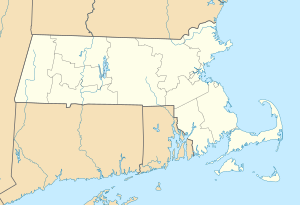Effie M. Morrissey

Effie M. Morrissey in 1894
|
|
| History | |
|---|---|
|
|
|
| Name: | Effie M. Morrissey |
| Builder: | John F. James & Washington Tarr, Essex, Massachusetts |
| Launched: | 1 February 1894 |
| Renamed: | Ernestina |
| Status: | Training vessel |
| General characteristics | |
| Type: | Two-masted Gaff rigged schooner |
| Displacement: | 120 gross tons |
| Length: |
|
| Beam: | 24 ft 5 in (7.4 m) |
| Draft: | 13 ft (4.0 m) |
| Propulsion: | Sails and diesel engine |
| Sail plan: | 8,000 sq ft (740 m2) |
|
Ernestina (schooner)
|
|
| Location | Steamship Wharf, New Bedford, Massachusetts |
| Coordinates | 41°38′2.42″N 70°55′14.22″W / 41.6340056°N 70.9206167°WCoordinates: 41°38′2.42″N 70°55′14.22″W / 41.6340056°N 70.9206167°W |
| Built | 1894 |
| Architect | George Melville McClain; James & Tarr Shipyards |
| Architectural style | Other |
| NRHP Reference # | 85000022 |
| Significant dates | |
| Added to NRHP | January 03, 1985 |
| Designated NHL | December 14, 1990 |
Effie M. Morrissey (now Ernestina-Morrissey) was a schooner skippered by Robert Bartlett that made many scientific expeditions to the Arctic, sponsored by American museums, the Explorers Club and the National Geographic Society. She also helped survey the Arctic for the United States Government during World War II. She is currently designated by the United States Department of the Interior as a National Historic Landmark as part of the New Bedford Whaling National Historical Park. She is the State Ship of Massachusetts.
Designed by George McClain of Gloucester, Massachusetts to withstand North Atlantic gales, Effie M. Morrissey was the last fishing schooner built for the Wonson Fish Company. Built with white oak and yellow pine at the John F. James & Washington Tarr shipyard, she took four months to build and was launched 1 February 1894. Her hull was painted black and her first skipper was William Edward Morrissey, who named her after his daughter Effie Maude Morrissey. In 2014, the ship was given the green light by the Massachusetts Department of Recreation and Conservation to undergo a $6 million restoration project at the Boothbay Harbor Shipyard in Boothbay Harbor, Maine. After months of waiting for the weather to cooperate, the ship was finally able to reach Boothbay Harbor in April, 2015 and was hauled-out later that month.
...
Wikipedia

